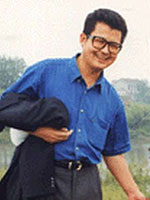




HONG KONG—After four days’ “disappearance” following his beating at the hands of local police, Guangdong-based lawyer Guo Feixiong has been detained after starting a protest outside a key government compound in the Chinese capital.
As his fellow activists continued a rolling hunger strike partly on his behalf, Guo launched his own personal protest in front of the Xinhuamen gate to the central government residential compound in Beijing, hunger-striker Zhao Xin wrote in an article posted on the China Information Network.
Guo handed in a petition, beginning a hunger strike that he had intended would last for 48 hours outside the gate, Zhao said.
However, he was detained by local police just one hour after arriving, and taken to a local police station at 5 p.m..
I feel a bit better now that I know he’s in the police station. It’s very cold in Beijing at the moment, and I was worried that he wouldn’t be able to cope with standing there for 48 hours,
“I am now in the Fuyou police station,” Guo told RFA’s Cantonese service in a brief conversation before his cellphone was cut off.
“I have been brought here by police. The police here are quite polite. Now I am waiting for their decision whether or not to detain me,” Guo said.
“Now I have to hang up, because they don’t want me to take phone calls here. I arrived at the Xinhua Gate at 4 p.m. this afternoon.”
Repeated attempts to reconnect to Guo, who is also known as Yang Maodong, were unsuccessful.
Guo’s sister, Yang Maoping, said she had been concerned about her brother’s plans to hunger strike outside the Xinhua Gate because temperatures were currently very low in Beijing.
“I feel a bit better now that I know he’s in the police station,” she told RFA reporter Lei Kin-kwan. “It’s very cold in Beijing at the moment, and I was worried that he wouldn’t be able to cope with standing there for 48 hours.”
Beijing-based lawyer and rights activist Gao Zhisheng said the fact that Guo had managed to arrive in Beijing at all without being intercepted by the authorities showed his high level of intelligence.
“That’s good news,” Gao said. “Guo was trying to do what should be the right of any Chinese citizen, to protest outside Xinhua Gate.”
“Because Guo’s behavior is protected by China’s constitution, he is demanding something which is essential to this country,” said Gao, who is Guo’s former boss and began the hunger strike precipitated by his beating earlier this week.
“And under the watchful eyes of the international media, the government has to be careful about what it does.”
Gao’s hunger strike, begun on behalf of Guo and others in the citizens’ rights movement mistreated by the authorities, has found strong support among other rights activists within China, including Yunnan-based lawyer Zhao Yan, Hong Kong Democratic Party lawmaker Ho Chun-yan, as well as supporters in the U.K, France, U.S., Canada, Hong Kong and Taiwan.
The Hong Kong Alliance in Support of Patriotic Democratic Movements in China said it planned to march to the Chinese central government Liaison Office in the city Saturday in support of Guo, Gao and the hunger-striking activists.
Guo first came to media attention as part of the legal team helping the villagers of Taishi, Guangdong province, to prepare a recall case against their elected village chief amid allegations of corruption during a land deal.
He was detained, formally arrested, then released without charge late last year, but then beaten at the weekend by police in the wake of the bitter and long-running dispute, during which he served as a member of Beijing-based lawyer Gao Zhisheng’s law firm.
Local authorities across China were scrambling to keep the lid on popular unrest in 2005, as new figures showed clashes on the rise from a year earlier.
The number of cases of public disorder in China rose to 87,000 last year, an increase of 6.6 percent compared with 2004, according to the Ministry of Public Security.
Original reporting in Cantonese by Lei Kin-kwan. RFA Cantonese service director: Shiny Li. Translated and written for the Web in English by Luisetta Mudie. Edited by Sarah Jackson-Han.